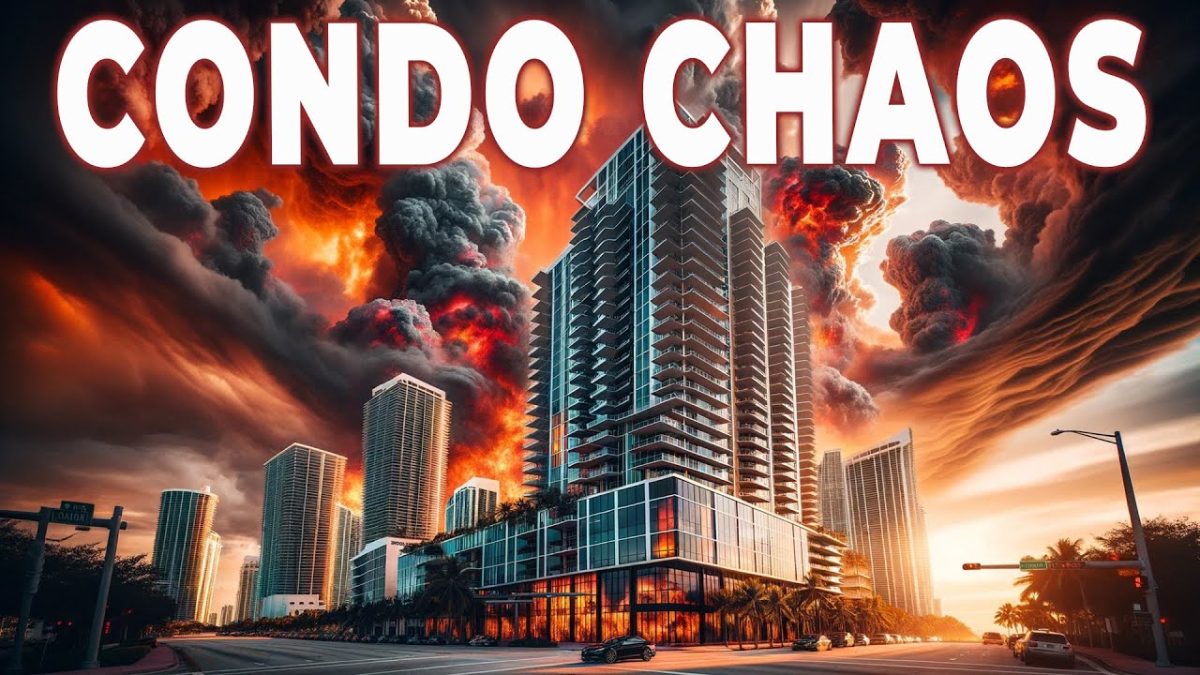Florida’s Looming Condo Crisis: Unveiling the Hidden Dangers
Florida’s Looming Condo Crisis:
Unveiling the Hidden Dangers
Discover the shocking truth about Florida’s condominium market, a ticking time bomb that could reshape the state’s real estate landscape. From inadequate reserves to skyrocketing insurance costs, we’ll explore the perfect storm brewing in the Sunshine State. Don’t miss this eye-opening discussion that could affect condo owners, buyers, and the Florida economy at large. Stay tuned until the end for crucial insights and actions to safeguard your investment.
Some context.
For several decades, most condominiums in Florida did not establish some sort of fund to set aside enough money to pay for future long-term maintenance costs. In fact, only two counties, Broward and Miami-Dade had rules that required inspection and recertification of high-rise condo buildings. However, in this case, compliance and enforcement were inconsistent. Moreover, many condo residents and owners pressured their boards to waive requirements to maintain reserves. Now, an unfortunate event happened in 2021 when the Champlain Towers South in Surfside collapsed, which killed 98 people and left hundreds homeless. One thing that needs to be mentioned here is that the 40-year inspection mandated by Miami-Dade’s recertification program was in progress before the collapse of the Champlain Towers South tragedy. However, crucial repairs had not been done when the building tragically collapsed. It took almost a year for state lawmakers to respond comprehensively, and it led to a seismic shift in condominium regulations. The state has created new laws that mandate a “milestone inspection” for all condominium buildings of three stories or higher at the 30-year mark, with subsequent assessments every 25 years if the structure is within three miles of a coastline. Going forward, these buildings are then subject to mandatory 10-year intervals for inspections. And at the same time, condo associations are no longer permitted to waive or underfunded reserves. It eventually forces them to ensure adequate funds for future structural repairs. The 2022 law, however, prompted substantial disruption. In response to this law, lawmakers and the governor adjusted the requirement for coastal buildings, extending the timeline to 30 years. Decisions regarding a 25-year inspection are now left to local governments, contingent upon “justified by local environmental conditions,” including proximity to seawater. The potential impact of these reinspections and ensuing costs is monumental. A report by Tampa Bay Times revealed that according to data from the Florida Department of Business and Professional Regulation cited in the Florida Bar’s report on the Surfside collapse, there are over 912,000 condominium units in Florida that have reached the 30-year milestone. Well, the total number of condominium units is about 1.5 million. Well, the state estimates that upwards of 2 million citizens reside in condo units aged 30 years and older. Unfortunately, uncertainty looms for those residing in older buildings that require extensive repairs. Some condo associations have raised concerns that past boards neglected to fund the reserves necessary for maintaining aging buildings, and now, the state provides no leeway in this regard.
Condo crisis coming?
Now, the new law is set to shake things up for condo owners. When this law is implemented in 2025, condominium residents will have to boost reserve accounts of the condo buildings to cover large, expensive repairs, and probable special assessments to fund major structural repairs. And at the same time, condo prices are going up because of increasing insurance costs. But, we will talk more about insurance costs later in this video. Anyways, this situation is exerting immense pressure on residents, particularly those on fixed incomes, for whom an additional $100 or $200 per month is a significant burden. Broward County Commissioner Mark Bogen has highlighted the gravity of the situation and warned that the looming surge in condominium costs might precipitate a surge in foreclosures, leaving many individuals, particularly the elderly, unable to sustain their residences. He said, “As it looks right now, there are going to be so many people unable to live in their homes. … This is going to really be a crisis in our state.”
Increasing insurance costs.
Homeowners’ insurance is getting worse in Florida. Homeowners insurance is a type of insurance that covers damage or loss to your property and personal belongings, as well as liability for injuries or property damage that you or your family cause to other people. Well, this insurance is essential for condo owners, as it protects them from financial losses in case of accidents, disasters, or lawsuits. However, according to a report by Forbes Advisor, Florida home insurance rates have shot up in recent years due to frequent natural disasters and litigation expenses that insurers pass on to consumers. The average cost of Florida home insurance is $2,385 a year, or about $199 a month, which is 31% more than the national average of $1,820. Florida has the second-highest number of homeowner associations in the country, right behind California. In fact, in Florida, the average member of a homeowner association pays anywhere from $100 to $500 in HOA fees each month. This means that condo owners in Florida have to pay a lot of money for insurance and HOA fees, which can add up to thousands of dollars a year. This puts a lot of financial pressure on condo owners, especially those who have low or fixed incomes, or who have mortgages or loans to pay off. The reality is that many condo owners are struggling to afford their insurance and HOA fees right now. We need to think that in the future, they might be facing the risk of losing their coverage, being sued by their HOA, or having their condo foreclosed by their lender. Therefore, the homeowners’ insurance situation in Florida is one of the major factors that contribute to the condo crisis, as it makes owning a condo more expensive and risky for many people.
Now, condo owners in Florida are also dealing with a diminishing pool of insurers. Despite representing only 8% of national property claims, the state shoulders over 75% of property claims lawsuits, and many of these lawsuits are deemed frivolous by legislators. What makes these matters complicated is Florida’s Assignment of Benefits law. This law placed insurance companies in a bind during legal battles over claims. Homeowners can opt to transfer claims to contractors, who can enlist legal representation without involving insurers initially. Under Florida law, if an attorney secures even a dollar more than the insurer’s offer, the insurer must cover the potentially inflated claim and foot the bill for all legal costs, often reaching thousands. Well Governor Ron DeSantis has condemned the AOB system. Ron has stated that this law has “degenerated into a racket.” Definitely, urgent reform is needed to address the insurance challenges and legal complexities in Florida’s condo landscape.
Secret quasi-government blacklist.
Another problem that needs to be highlighted is that many people are mysteriously getting rejected for mortgages when buying a condominium in South Florida. The problem? Well, for many people, the reason is that the condo is on a secret quasi-government blacklist. And a report published by the Miami Herald on December 15, 2023, revealed that Fannie Mae has been maintaining a secret database of condo buildings. And keep in mind that Fannie Mae is one of only two federally chartered companies that help determine who can qualify for home mortgages. Now, this company has created a database of hundreds of condo buildings in Florida that Fannie Mae will not back for loans. The major reason is maintenance or financial issues. If the condo is included in Fannie Mae’s secret list, it will become “next to impossible for owners as well as associations to get qualified for a mortgage.” They won’t even be able to refinance or obtain loans for repairs at normal rates or terms. Moreover, Fannie Mae’s insistence on lender confidentiality leaves rejected applicants in the dark about the reasons for denial. According to the Miami Herald’s report, the blacklist seems to have expanded significantly since Fannie Mae imposed stricter condo eligibility criteria post the 2021 Champlain Towers South collapse. Well, Fannie Mae initially denied these claims. However, the company later acknowledged the list’s existence and also revealed that they plan to create a searchable database accessible to owners and associations. However, this online tool won’t be available until the third quarter of 2024. Well, until the online tool is available, condo owners as well as associations will most probably be frustrated because they will find themselves in a state of uncertainty.
With all of this condo news, I would say that the condo crisis in Florida has serious implications for the economy, the environment, and the social welfare of the state. As a condo owner or buyer, you need to be aware of these issues and take action with time to protect yourself and your investment. You can do this by doing your research, comparing different options, and consulting with professionals.
It’s crucial to stay informed and take proactive steps to protect your interests. Reach out to me, Sharon Colon, for your real estate expert guidance and personalized advice on navigating this challenging landscape. Whether you’re a condo owner, buyer, or simply curious about the situation, I’m here to address your questions and concerns. Don’t hesitate; contact me today to discuss your options and find peace of mind in these uncertain times. For legal questions, I advice always to seek legal counseling.
In the meantime, if you would like to get a quick Miami home valuation, click HERE to get it for free.
Thank you for reading. I look forward to connecting with you in Miami soon!
If you’re considering buying or selling in Miami, don’t hesitate. CLICK HERE or call me at 786-376-2398 to make your move.
Discover the wonders of this vibrant city and stay informed with my weekly recap NEWSLETTER . Gain valuable insights about Miami, FL and more that will greatly benefit you.
Take the next step in your real estate journey. Contact Sharon today and unlock the possibilities that await you!
Subscribe to my YouTube Channel: SUBSCRIBE!

Sharon Colón
Your Favorite Real Estate Agent in Miami
ΓEA⅃ Broker, LLC
786-376-2398
[email protected]
www.sharoncolonre.com

